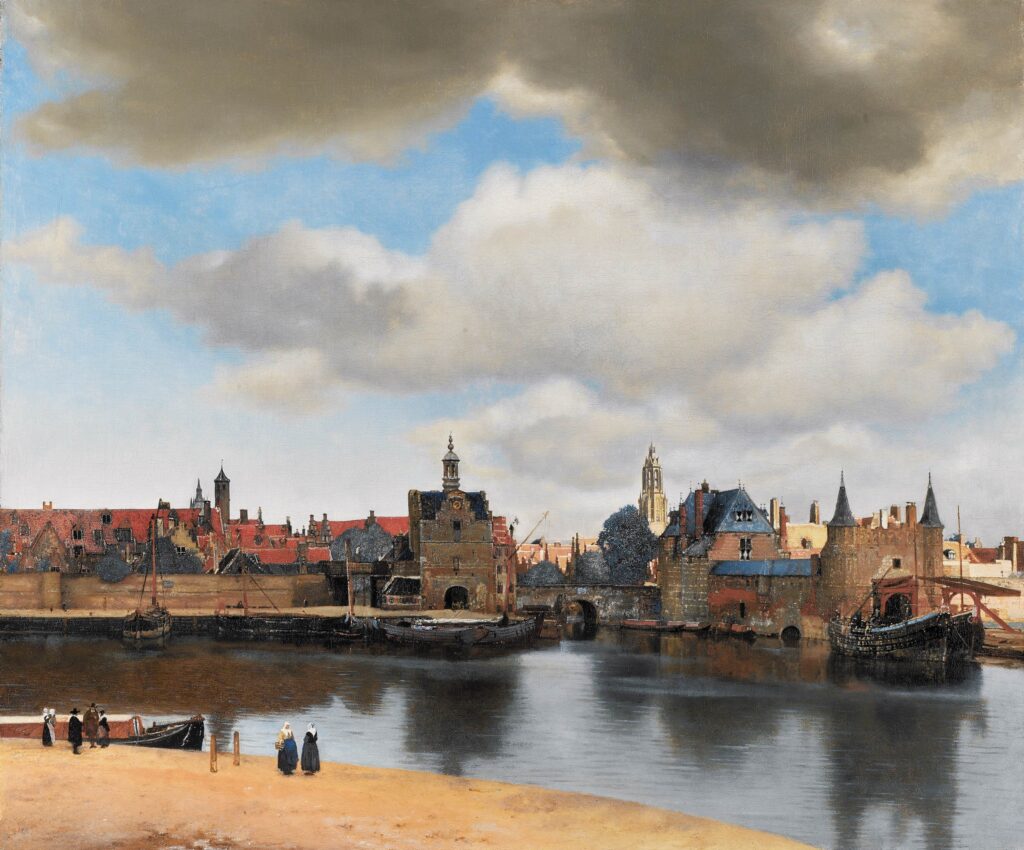The famous little patch of yellow

Vermeer’s “View of Delft”
I find it encouraging that the greatest philosopher and the greatest novelist of the 20th century agreed about some fundamental, crucial things, at about the same time, early in the century. It seems everyone else except maybe T.S. Eliot were heading in the opposite direction—Nietzsche a bit earlier, the modernists in art, Einstein in physics, Freud in his field, Marx in economics and politics–all of them striving to destabilize the values and norms of the Western world. Meanwhile, Wittgenstein and Proust were suggesting that the most fundamental realities hadn’t changed at all and would never change, even though many didn’t understand this about the philosopher, and it this isn’t immediately obvious in Proust, given the structure of his virtually plotless novel, a tapestry of interwoven stories that evolve almost imperceptibly toward his majestic renunciation of society in favor of art.
Wittgenstein, whose efforts have been camouflaged by his role as the patron saint of analytical 20th century philosophy, asserted that human values can’t be derived from our experience in the world. They exist outside the world, and thus, in a sense, can’t be analyzed or deduced, but are simply a given, transcendent and immune to rational justification or questioning. They have no utility. They just are. You don’t “adopt” them to make the world a better place (on what grounds would one chose a set of values that give you the rules for calculating which values are best?). Goodness is an unassailable framework within which human purposes evolve and can be understood. Goodness and truth and beauty govern human behavior, as the essential structure of human experience, whether or not an individual is conscious of them or not. In other words, Wittgenstein actually had a metaphysics, about which he forbade himself to talk, because its truth was impossible to prove, hence the famous last line of the Tractatus: “Whereof one cannot speak, one must remain silent.” However, he meditated quite a bit on these values during that silence. He carried around a copy of Tolstoy’s The Gospel in Brief all through his service in World War I, and he relinquished one of the largest inheritances in Europe. He seriously considered becoming a monk at one point. These transcendent values he lived, rather than asserted, because he appeared to consider them impossible to justify through reason or philosophical language. His silence about everything that actually mattered seems, in retrospect, almost uniquely noble and honest.
One finds a similar point of view, an even more Platonic one, from Marcel Proust in A La Recherche du Temps Perdu, written during the years Wittgenstein wrote his Tractatus, about the death of Proust’s fictional novelist, Bergotte. In The Captive, he talks about the role of the creative imagination, in painting and fiction and music. These thoughts precede one of the great revelatory moments in the story, when Morel’s musical performance triggers for the narrator a crucial moment of enlightenment about the nature of art. (It is typical of Proust that Morel is one of his few genuinely evil characters, the embodiment of sadistic cruelty, yet he is also, despite his depravity, a rare musical genius, one of God’s messengers, as it were, through the medium of the violin.) This passage makes Proust’s narrator sound a bit like a Cathar or a Buddhist, but his essential point is that human beings don’t pick and choose their “values;” those values precede and ground all human choices and behavior, and people spend their lives struggling to simply see them and exemplify them as directly as possible, to live “beneath the sway of those unknown laws”—an achievement that is, like a great golf swing or a sumi-e painting—both unconscious and ego-less, almost automatic, when done perfectly, and yet immensely difficult to “get right”:
He was dead. Dead forever? Who can say? . . . All that we can say is that everything is arranged in this life as though we entered it carrying a burden of obligations contracted in a former life; there is no reason inherent in the conditions of life on this earth that can make us consider ourselves obliged to do good, to be kind and thoughtful, even to be polite, nor for an atheist artist to consider himself obliged to begin over again a score of times a piece of work the admiration aroused by which will matter little to his worm-eaten body, like the patch of yellow wall painted with so much skill and refinement by an artist destined to be forever unknown and barely identified under the name Vermeer. All these obligations, which have no sanction in our present life, seem to belong to a different world, a world based on kindness, scrupulousness, self-sacrifice, a world entirely different from this one and which we leave in order to be born on this earth, before perhaps returning there to live once again beneath the sway of those unknown laws which we obeyed because we bore their precepts in our hearts, not knowing whose hand had traced them there—those laws to which every profound work of the intellect brings us nearer and which are invisible only—if then!—to fools. So the idea that Bergotte was not permanently dead is by no means improbable.
–The Captive
Comments are currently closed.